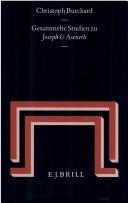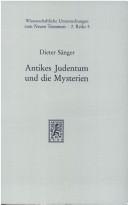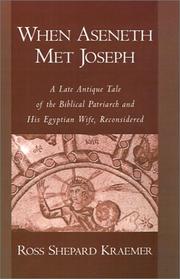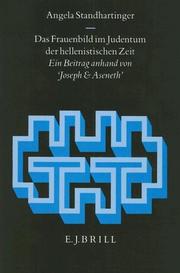| Listing 1 - 10 of 10 |
Sort by
|

ISSN: 09293523 ISBN: 9004106286 9789004106284 9004675582 Year: 1996 Volume: 13 Publisher: Leiden: Brill,
Abstract | Keywords | Export | Availability | Bookmark
 Loading...
Loading...Choose an application
- Reference Manager
- EndNote
- RefWorks (Direct export to RefWorks)
This collection of essays deals with the ancient Jewish romance called Joseph and Aseneth. It tells how Aseneth, daughter of an Egyptian priest, became the wife of Joseph, Pharaoh's viceroy, following her conversion to the God of the Hebrews. It is an instructive witness to Jewish diaspora theology and hence to the soil on which Christianity grew. The earliest form of the work is disputed. No full critical edition currently exists. The volume assembles 13 studies previously published from 1961 to 1991 in German, English, and French, including a preliminary Greek text and the Serbo-Slavonic translation. They are accompanied by a fresh introduction, bibliography, and indexes. The book documents 40 years of research and may serve as a basis for further study of the textual tradition and the theological and cultural importance of Joseph and Aseneth.
Joseph and Aseneth --- Criticism, interpretation, etc --- 229*227 --- Jozef en Asenath --- 229*227 Jozef en Asenath --- Aseneth (Biblical tale) --- Bible. --- Book of Aseneth --- Confession and prayer of Aseneth --- Conversion of Aseneth --- Joseph and Asenath --- Joseph u. Aseneth --- Joseph und Aseneth --- Prayer of Aseneth --- Criticism, interpretation, etc. --- Ioseph patriarcha filius Iacob --- Aseneth filia Pentephri uxor Ioseph patriarchae --- Aseneth et Ioseph --- Women in Judaism.
Book
ISSN: 1861602X ISBN: 9783110201406 3110201402 1282187503 3110211114 9786612187506 Year: 2008 Volume: 5 Publisher: Berlin: de Gruyter,
Abstract | Keywords | Export | Availability | Bookmark
 Loading...
Loading...Choose an application
- Reference Manager
- EndNote
- RefWorks (Direct export to RefWorks)
Joseph and Aseneth --- Criticism, Textual --- 229*227 --- Jozef en Asenath --- 229*227 Jozef en Asenath --- Aseneth (Biblical tale) --- Bible. --- Book of Aseneth --- Confession and prayer of Aseneth --- Conversion of Aseneth --- Joseph and Asenath --- Joseph u. Aseneth --- Joseph und Aseneth --- Prayer of Aseneth --- Criticism, Textual. --- Aseneth et Ioseph --- Aseneth filia Pentephri uxor Ioseph patriarchae --- Ioseph patriarcha filius Iacob

ISBN: 3161428714 9783161428715 Year: 1980 Volume: 5 Publisher: Tübingen: Mohr,
Abstract | Keywords | Export | Availability | Bookmark
 Loading...
Loading...Choose an application
- Reference Manager
- EndNote
- RefWorks (Direct export to RefWorks)
Mysteries, Religious --- 222.2 --- Mystery religions --- Religious mysteries --- Religion --- Secret societies --- Rites and ceremonies --- Genesis --- Theses --- Joseph and Aseneth. --- Aseneth (Biblical tale) --- Bible. --- Book of Aseneth --- Confession and prayer of Aseneth --- Conversion of Aseneth --- Joseph and Asenath --- Joseph u. Aseneth --- Joseph und Aseneth --- Prayer of Aseneth

ISBN: 1280454105 019535415X 058522594X 9780585225944 9781280454103 0195114752 9780195114751 0197592228 0190492651 Year: 1998 Publisher: New York: Oxford university press,
Abstract | Keywords | Export | Availability | Bookmark
 Loading...
Loading...Choose an application
- Reference Manager
- EndNote
- RefWorks (Direct export to RefWorks)
This is a study of an anonymous ancient work, originally composed in Greek, titled Joseph and Aseneth. Although relatively unknown outside of scholarly circles, the story is remarkable because of its focus on a female character.
Christianity. --- Christianity --- Religions --- Church history --- Joseph and Aseneth --- Aseneth (Biblical tale) --- Bible. --- Book of Aseneth --- Confession and prayer of Aseneth --- Conversion of Aseneth --- Joseph and Asenath --- Joseph u. Aseneth --- Joseph und Aseneth --- Prayer of Aseneth --- Criticism, interpretation, etc. --- 229*227 --- 229*227 Jozef en Asenath --- Jozef en Asenath --- Religion.
Book
ISBN: 0884144577 0884144585 9781628372830 1628372834 9780884144571 9780884144588 Year: 2020 Publisher: Atlanta, GA SBL Press
Abstract | Keywords | Export | Availability | Bookmark
 Loading...
Loading...Choose an application
- Reference Manager
- EndNote
- RefWorks (Direct export to RefWorks)
"Aseneth of Egypt examines texts of Joseph and Aseneth to propose a base storyline that can be used to locate the story's origin. Patricia D. Ahearne-Kroll contextualizes the story of Joseph and Aseneth in Hellenistic Egypt by demonstrating how the base storyline reflects the literary impulse of Greek-speaking Jewish writers to redescribe their identity in Egypt, Ptolemaic strategies of legitimation of power, and Judean connections to the land of Egypt"--
Judaism --- 229*227 --- 229*227 Jozef en Asenath --- Jozef en Asenath --- Jews --- Religions --- Semites --- Religion --- Joseph and Aseneth --- Aseneth (Biblical tale) --- Bible. --- Book of Aseneth --- Confession and prayer of Aseneth --- Conversion of Aseneth --- Joseph and Asenath --- Joseph u. Aseneth --- Joseph und Aseneth --- Prayer of Aseneth --- Criticism, interpretation, etc.

ISBN: 9004103503 9004332790 9789004103504 Year: 1995 Volume: 26 Publisher: Leiden: Brill,
Abstract | Keywords | Export | Availability | Bookmark
 Loading...
Loading...Choose an application
- Reference Manager
- EndNote
- RefWorks (Direct export to RefWorks)
Each of the two reconstructed “oldest texts” of the intertestamental work, Joseph and Aseneth , presents a consistent picture with a coherent theology, but there are considerable differences between them. The image of women in each case serves to crystallise these differences, and their analysis opens a window not only on the texts but also on their social contexts. The author develops a method which allows close study of ancient literary images of women and of their effects on ancient readers. It is shown that the different images portrayed in the two versions correspond to differing trends in the pagan and Jewish environment and in Jewish-Hellenistic interpretations of the Bible. A controversy of social and theological importance emerges.
Femmes dans le judaïsme --- Vrouwen in het jodendom --- Women in Judaism --- Women in Judaism. --- Joseph and Aseneth --- Criticism, interpretation, etc. --- 229*227 --- Judaism --- Jozef en Asenath --- Theses --- 229*227 Jozef en Asenath --- Femmes dans le judaïsme --- Aseneth (Biblical tale) --- Bible. --- Book of Aseneth --- Confession and prayer of Aseneth --- Conversion of Aseneth --- Joseph and Asenath --- Joseph u. Aseneth --- Joseph und Aseneth --- Prayer of Aseneth --- Criticism, interpretation, etc --- Joseph and Aseneth.
Book
ISBN: 9783161501623 9783161501616 3161501624 3161564391 9783161564390 Year: 2009 Volume: 15 Publisher: Mohr Siebeck
Abstract | Keywords | Export | Availability | Bookmark
 Loading...
Loading...Choose an application
- Reference Manager
- EndNote
- RefWorks (Direct export to RefWorks)
Liebes- und Bekehrungsgeschichte in einem - die Erzählung von der stolzen ägyptischen Priestertochter Aseneth, ihrer Liebe zu Joseph, dem Sohn Jakobs, ihrer Bekehrung und Bewahrung, wird in einer aktuellen Übersetzung auf neuester textkritischer Grundlage geboten.
Apocryphal books (Old Testament) --- Criticism, interpretation, etc --- Joseph and Aseneth --- 229*227 --- Jozef en Asenath --- Grieks --- Josef en Asenath (anoniem) --- Criticism, interpretation, etc. --- 229*227 Jozef en Asenath --- Grieks. --- Josef en Asenath (anoniem). --- History and criticism --- Aseneth (Biblical tale) --- Bible. --- Book of Aseneth --- Confession and prayer of Aseneth --- Conversion of Aseneth --- Joseph and Asenath --- Joseph u. Aseneth --- Joseph und Aseneth --- Prayer of Aseneth --- Aseneth filia Pentephri uxor Ioseph patriarchae --- Ioseph patriarcha filius Iacob --- Aseneth et Ioseph --- Religion / Theology --- Religion --- Joseph --- Aseneth --- Hellenistisches Judentum --- Bekehrung --- Konversion --- Sohn Gottes --- Editionen, Textausgaben --- Altes Testament --- Antike --- Studienliteratur --- Religionsgeschichte --- Alte Geschichte --- Antike Philosophie
Book
ISBN: 9780567688101 0567688100 9780567688132 9780567688118 0567688135 0567688119 Year: 2019 Volume: 612 Publisher: New York: T&T Clark International,
Abstract | Keywords | Export | Availability | Bookmark
 Loading...
Loading...Choose an application
- Reference Manager
- EndNote
- RefWorks (Direct export to RefWorks)
Generically, theologically, and concerning content, Mark and Joseph and Aseneth are quite different. The former is a product of the nascent Jesus movement and influenced by the Greco-Roman Bioi (“Lives”). It details the life, ministry, death, and resurrection of a wandering Galilean. The latter is a Hellenistic Jewish narrative influenced by Greek romances and Jewish novellas. It expands the laconic account of Joseph's marriage to Aseneth in Genesis 41 into a full-fledged love and adventure story.Despite these differences, Elder finds remarkable similarities that the texts share. Elder uses both texts to examine media and modes of composition in antiquity, arguing that they were both composed via dictation from their antecedent oral traditions. Elder's volume offers a fresh approach to the composition of both Joseph and Aseneth and Mark as well as to many of their respective interpretive debates.
Narration (Rhetoric) --- Bible. --- Joseph and Aseneth --- Criticism, interpretation, etc. --- 229*227 --- 226.3 --- 22.02 --- 22.02 Bijbelse filologie. Analyse van het bijbels taalgebruik --- 22.02 Philologie de la Bible. Analyse linguistique de la Bible --- Bijbelse filologie. Analyse van het bijbels taalgebruik --- Philologie de la Bible. Analyse linguistique de la Bible --- 226.3 Evangelie volgens Marcus --- 226.3 Evangile de S. Marc --- Evangelie volgens Marcus --- Evangile de S. Marc --- 229*227 Jozef en Asenath --- Jozef en Asenath --- Narrative (Rhetoric) --- Narrative writing --- Rhetoric --- Discourse analysis, Narrative --- Narratees (Rhetoric) --- Marco (Book of the New Testament) --- Mark (Book of the New Testament) --- Markus (Book of the New Testament) --- Markusevangelium --- Vangelo di Marco --- Book of Mark --- Aseneth (Biblical tale) --- Book of Aseneth --- Confession and prayer of Aseneth --- Conversion of Aseneth --- Joseph and Asenath --- Joseph u. Aseneth --- Joseph und Aseneth --- Prayer of Aseneth
Book
ISBN: 9780199754519 0199754519 0199827214 0199826536 9786612906138 1282906135 Year: 2011 Publisher: New York Oxford University Press
Abstract | Keywords | Export | Availability | Bookmark
 Loading...
Loading...Choose an application
- Reference Manager
- EndNote
- RefWorks (Direct export to RefWorks)
"Self-restraint may appear to be the opposite of erotic desire ; yet Diane Lipsett shows the surprising and complex interplay of erotic desire and self-restraint in three ancient tales of conversion. She offers nuanced literary analysis of The Shepherd of Hermas, from the Apostolic Fatehrs, the Acts of Paul and Thecla, from the Apocryphal Acts of the Apostles, and Joseph and Aseneth, often considered an ancient Jewish novella. Lipsett examines codes concerning marriage and continence, virginity, and sexual renunciation in the three tales. She finds that 'conversion' - a marked change in a protagonist's piety and identity - is in part an effect of story, a function of narrative textures, coherence, and closure."--Front inside flap of dust jacket.
Askese. --- Begeerte. --- Begierde. --- Bekehrung. --- Bekering. --- Conversion --- Desire --- Handelingen van Paulus (apocrief). --- Josef en Asenath (anoniem). --- Pastor (Hermas). --- Christianity --- History. --- Christianity. --- Judaism --- Judaism. --- Religious aspects --- Hermas, --- Hermas. --- Paulus, --- Acts of Paul and Thecla. --- Joseph and Aseneth. --- Joseph et Aseneth. --- Paulusakten. --- Shepherd (Hermas). --- 229*225 --- 276 =75 HERMAS --- 229*225 Griekse Ezra-apocalypse --- Griekse Ezra-apocalypse --- Appetency --- Craving --- Longing --- Yearning --- Emotions --- Religious conversion --- Psychology, Religious --- Proselytizing --- Christianity&delete& --- History --- Judaism&delete& --- Religious aspects&delete& --- Griekse patrologie--HERMAS --- Hermas (Apostolic Father) --- Aseneth (Biblical tale) --- Bible. --- Book of Aseneth --- Confession and prayer of Aseneth --- Conversion of Aseneth --- Joseph and Asenath --- Joseph u. Aseneth --- Joseph und Aseneth --- Prayer of Aseneth --- Acta Pauli et Theclae --- Actes de Paul et Thècle
Book
ISBN: 9783161562617 3161562615 9783161562624 3161562623 Year: 2019 Volume: 106 Publisher: Tübingen: Mohr Siebeck,
Abstract | Keywords | Export | Availability | Bookmark
 Loading...
Loading...Choose an application
- Reference Manager
- EndNote
- RefWorks (Direct export to RefWorks)
In recent decades, the debate on monotheism and religious pluralism has been strongly influenced by the idea that monotheism originating in the Old Testament is the root of intolerance and violence. In this study, Daniela Scialabba investigates inclusive tendencies in Old Testament monotheism, in particular theological principles motivating and supporting the possibility of a positive relationship between non-Israelites and the God of Israel. Thus, she examines three texts thoroughly: the Book of Jonah, Psalm 33 (MT and LXX), and the novel »Joseph and Aseneth«. Despite their difference concerning genre, date of origin and provenance, these texts have important ideas in common: the relationship between the God of Israel and non-Israelites as well as the concept of God as a universal creator who has pity with all his creatures.
Providence and government of God --- Religious pluralism --- Monotheism. --- Biblical teaching. --- Bible. --- Joseph and Aseneth. --- Criticism, interpretation, etc. --- Theology. --- Israel --- Religion --- History. --- Monotheism --- 221.08*1 --- 211.219 --- 211.219 Monotheïsme; polytheïsme; monisme (theodicee) --- Monotheïsme; polytheïsme; monisme (theodicee) --- 221.08*1 Theologie van het Oude Testament: uitverkiezing; verbond; volk Gods --- Theologie van het Oude Testament: uitverkiezing; verbond; volk Gods --- Pantheism --- Theism --- Trinity --- Polytheism --- Pluralism (Religion) --- Pluralism --- Religions --- Biblical teaching --- Joseph and Aseneth --- Aseneth (Biblical tale) --- Book of Aseneth --- Confession and prayer of Aseneth --- Conversion of Aseneth --- Joseph and Asenath --- Joseph u. Aseneth --- Joseph und Aseneth --- Prayer of Aseneth --- Biblos Psalmon (Book of the Old Testament) --- Buch der Preisungen (Book of the Old Testament) --- Liber Psalmorum (Book of the Old Testament) --- Mazāmīr (Book of the Old Testament) --- Preisungen (Book of the Old Testament) --- Psalmen (Book of the Old Testament) --- Psalmoi (Book of the Old Testament) --- Psalms (Book of the Old Testament) --- Psalms of David (Book of the Old Testament) --- Psaumes (Book of the Old Testament) --- Pseaumes de Dauid (Book of the Old Testament) --- Salmenes bok (Book of the Old Testament) --- Salmos (Book of the Old Testament) --- Shihen (Book of the Old Testament) --- Sifr al-Mazāmīr (Book of the Old Testament) --- Soltar (Book of the Old Testament) --- Tehilim (Book of the Old Testament) --- Tehillim (Book of the Old Testament) --- תהלים (Book of the Old Testament) --- Zsoltárkönyv (Book of the Old Testament) --- Jonah (Book of the Old Testament) --- Jonas (Book of the Old Testament) --- Yonah (Book of the Old Testament) --- Antico Testamento --- Hebrew Bible --- Hebrew Scriptures --- Kitve-ḳodesh --- Miḳra --- Old Testament --- Palaia Diathēkē --- Pentateuch, Prophets, and Hagiographa --- Sean-Tiomna --- Stary Testament --- Tanakh --- Tawrāt --- Torah, Neviʼim, Ketuvim --- Torah, Neviʼim u-Khetuvim --- Velho Testamento --- Theology --- Dawlat Isrāʼīl --- Država Izrael --- Dzi︠a︡rz︠h︡ava Izrailʹ --- Gosudarstvo Izrailʹ --- I-se-lieh --- Israele --- Isrāʼīl --- Isŭrael --- Isuraeru --- Izrael --- Izrailʹ --- Medinat Israel --- Medinat Yiśraʼel --- Stát Izrael --- State of Israel --- Yiselie --- Yiśraʼel --- Ισραήλ --- Израиль --- Государство Израиль --- Дзяржава Ізраіль --- Ізраіль --- מדינת ישראל --- ישראל --- إسرائيل --- دولة إسرائيل --- イスラエル --- 以色列 --- Palestine --- History --- Providence and government of God - Biblical teaching. --- Religious pluralism - Biblical teaching. --- Israel - Religion - History.
| Listing 1 - 10 of 10 |
Sort by
|

 Search
Search Feedback
Feedback About UniCat
About UniCat  Help
Help News
News